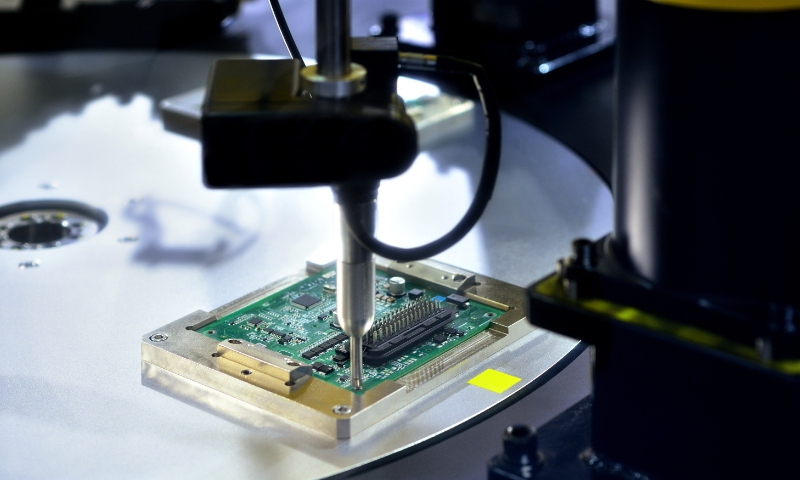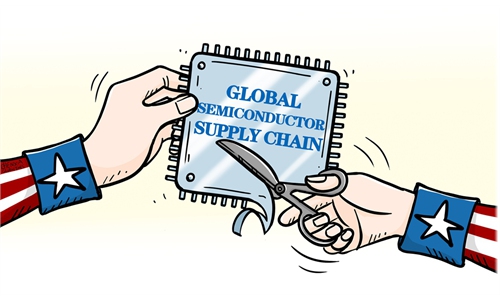China's leading memory chip maker YMTC sues Micron for patent infringement in US
Move shows Chinese chip strengths, a legal counterattack to defend rights

Production of semiconductor chip File photo: VCG
China's leading memory chip producer Yangtze Memory Technologies Co (YMTC) filed a lawsuit against US-based Micron Technology and its wholly owned subsidiary, Micron Consumer Products Group, on Thursday for infringement of eight of YMTC's patents, the Global Times learned from the official website of the US District Court for the Northern District of California on Sunday.Chinese analysts said that the move is a landmark event for Chinese memory chip enterprises to formally launch a counterattack against US chip companies, which also indicates that Chinese enterprises lead the world and are completely free from US sanctions in the field of memory chips.
YMTC said the lawsuit was meant to end Micron's widespread and unauthorized use of its patented innovations, according to a report by Chinese business news portal Yicai.com. YMTC cited Micron's illegal use of its patented technology to fend off market competition and gain and protect market share.
The lawsuit seeks to address Micron's attempt to prevent competition and innovation by forcing YMTC out of the 3D NAND Flash market, said the Chinese company.
"YMTC's move will encourage enterprise innovation, safeguard its legitimate rights and maintain normal market competition," Wang Peng, an associate researcher at the Beijing Academy of Social Sciences, told the Global Times on Sunday.
It also showed that China's innovation capability in memory chips has continuously been enhanced, Wang said. "In addition, as China's business and innovation environment constantly improves, Chinese enterprises will have more backing and legal tools to defend their legitimate rights and interests."
As detailed in the indictment, YMTC noted that it is no longer a new market entrant but has become a significant player in the global 3D NAND market.
YMTC said that last November, TechInsights, a company that analyzes and tracks the flash memory market, concluded that the Chinese company was the leader in the 3D NAND flash memory sector, outpacing Micron.
"The lawsuit shows that China's memory chip companies formally launched a counterattack on US companies to defend their legal rights and interests. It also indicates that Chinese chip producers have formed a complete industry chain from memory chip technological research and development to manufacturing, free from the unreasonable US suppression," Ma Jihua, a Beijing-based industry analyst, told the Global Times on Sunday.
NAND flash and DRAM are the two main types of memory chips. NAND flash enables the manufacture of memory devices such as solid state drives, which are used in products such as cellphone servers, and personal computers.
Chinese chipmakers are in the world's leading position in terms of the level of layers of chips, Ma noted. "The lawsuit showed that YMTC's intellectual property rights are more advanced than those of Micron, proving that the Chinese firm has sufficient backing in protecting its rights, and it is a wake-up call to other related enterprises in the US."
In 2018, YMTC mass-produced its first-generation 32-layer 3D NAND flash chips, and in 2020 developed two 128-layer flash products. In October 2022, the US government issued an export control regulation, restricting the export of chip manufacturing equipment to China. In December, the US added YMTC to its entity list for export controls.
In addition to NAND flash, Micron is also one of the major DRAM producers. In 2016, Fujian Jinhua Integrated Circuit Co (JHICC), another major memory chip company that produces DRAM chips, signed a technical cooperation agreement with UMC to develop DRAM-related process technology. It invested $5.65 billion in a 12-inch wafer fab production line in Jinjiang, East China's Fujian Province.
In 2017, Micron sued JHICC and UMC in the US, claiming that JHICC employees stole its intellectual property rights. One year later, the US Department of Commerce added JHICC to its entity list for export controls.
Ma noted that intellectual property is itself a product of global cooperation, that is, mutual licensing for the purpose of commercial cooperation. "However, Micron's practice in 2017 serves as a bad example for cooperation and has become one of the tools the US uses to suppress Chinese chip companies," Ma said, adding that YMTC's lawsuit is entirely reasonable both legally and in terms of international rules.



